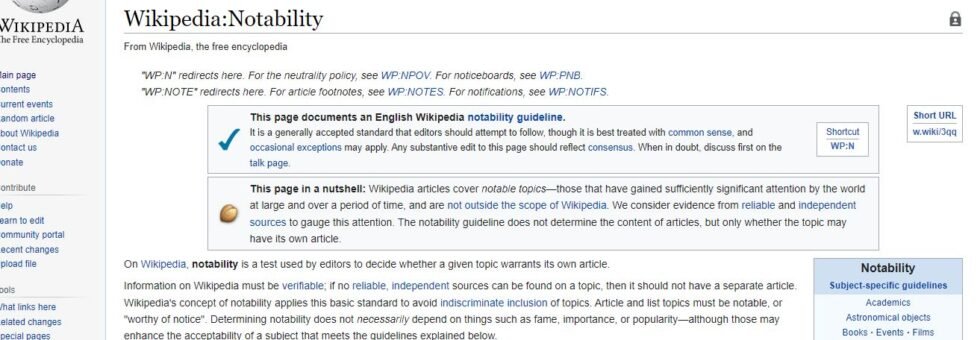What is the definition of notability?
“Notability is a criterion used by editors to determine whether a topic is eligible to have its own page,” Wikipedia explains. Simply defined, it indicates that the issue complies with the numerous requirements established by editors for its inclusion in Wikipedia. There are broad notability rules, as well as various subcategories of these Wikipedia Guidelines that address specific issues. Wikipedia’s notability is a difficult concept to grasp for a layman and you can always take some help from professional Wikipedia service providers like Wikioo.
To determine if your topic is remarkable and if it can be reckoned as eligible for Wikipedia, you must first learn the unique Wikipedia guidelines that cover Notability for your topic. For example, if you want to create an article on a startup company or an established company, make sure it follows the Wikipedia notability rules for the organization (also called WP: NCORP), which has briefly been discussed here:
Is it necessary for you to build a Wikipedia page?
- Your firm has created or invented an industry-changing technology. This technology can be in the domain of mechanical, chemical, or musical in nature (e.g., iTunes).
- Your firm or its founder is “notable”. To assess if your subject is worthy of a Wikipedia entry, Wikipedia editors use a “notability” test.
- If your firm has developed anything or if your founder is a notable figure (for example, a well-known novelist or the first person to sail a boat across the ocean), your company or founder may be a suitable fit. Wikipedia doesn’t have any information on your technology or topic.
- Please be mindful here that if the founder of a company is notable, it may not entail that the company itself is notable. This intransitivity is termed as Non-inheritance and is covered under the Wikipedia guideline WP: NOTINHERITED.

What role does authority and influence have in Wikipedia eligibility?
- Notability is a criterion used by Wikipedia to decide if a topic or issue is deserving of its own article.
- The capacity of a subject to attract attention based on its worth over a long period of time is known as notability.
- As it happens typically, a significant person or a significant public company may become well-known over time by garnering attention.
- To be considered important enough for a Wikipedia entry, a subject must be the principal focus of numerous trustworthy information sources.
- Notoriety and popularity are not synonymous.
- When compared to an article on a person or a company, a Wikipedia page about a bug or plant is simpler to find.
For anybody seeking to utilize Wikipedia for marketing and promotion, the platform may be a real pain. Wikipedia’s founders expressly forbade the use of the site as a marketing tool. There are certain rules for creating a Wikipedia page. However, its widespread high search engine ranks attract marketers and company owners alike, despite the fact that few are able to navigate Wikipedia’s numerous convoluted nuances.
Notability is the most significant barrier to a Wikipedia page’s success. Wikipedia is still an encyclopedia at the end of the day. Wikipedia isn’t a place where you’ll find just any old business profile. To create some distance between the two goals, Wikipedia established a set of notability criteria that a subject must meet in order to be considered for its own page.
Even if you satisfy all of the Wikipedia guidelines for notability, the community of experienced editors (including administrators) may decide to remove your article citing some violation of policy and as it happens the most such violations are related to notability issues i.e. failing to show enough notability. So, in addition to ensuring that your article is significant for Wikipedia, double-check that you have appropriately cited the page, followed the formatting guidelines for the relevant issue, and avoided arguing with or offending anyone in the Wikipedia community. This is because of the Wikipedia notability standards which have to be met.
The majority of people and corporations are not eligible for a Wikipedia article. But that does not exclude someone from submitting one, but one of two things is likely to occur:
- It will either not be published or will be deleted shortly (deleted pages are harder to get a second time)
- There are thousands of editors whose entire purpose in life appears to be to delete articles based on their lack of notoriety, and they are quite good at it. Wikipedia bots of many kinds help a lot of people.
As it happens with most of the significant public figures or prominent companies, they may become well-known by capturing attention with time. Unless there are some dramatic events that results numerous coverages in top publications, infrequent news articles or spurts of popularity are usually insufficient to establish notability. There’s a place for sensationalism, too. Designing and creating a building, for example, will not earn you a Wikipedia entry nearly as quickly as blowing one up. In general, a corporation becomes noteworthy enough to have its own Wikipedia article by:
- Contributing to its industry on a regular basis
- Having attention-getting corporate social responsibility (whether positive or negative)
- Innovating
- Having sustained and attention-getting market performance
- Standing out in any other way for a long period
Notability is a long-term ability of a topic to draw attention based on its own merits, rather than a transient ability.
Significant coverage
As the name implies, significant coverage means precisely that, the subject must have been well covered in a variety of sources. If the issue is covered in passing in the article, but not in great detail, it is unimportant and does not reach the threshold. A featured article on the topic that covers it in depth would be acceptable. If you are a person and were merely mentioned in passing in an article, this will not be deemed substantial publicity.
With certain subject-specific caveats pertaining to independence, Wikipedia articles are typically published based on in-depth, independent, and credible sourcing. Verifiable criteria on a topic are frequently included in subject-specific notability requirements, demonstrating that suitable sources are likely to exist. As a result, subjects that pass an SNG (subject-specific notability guideline) are thought to be worthy of an article; however, articles that pass an SNG or the GNG (general notability guideline) may still be removed or merged into another page, especially if proper sourcing or extensive coverage cannot be found, or if the topic is not appropriate for an encyclopaedia.SNGs can also serve a variety of other uses, depending on the issue. Some SNGs, such as those devoted to films, biographies, and politicians, offer advice on when subjects should not be developed.
Reputable sources
We’ve discussed reliable sources in a number of publications. In general, a trustworthy source is one that does fact checks and publishes media reports that have been verified through sources and are regarded as trustworthy by those who read them. Self-published sources, such as press releases, are not trustworthy since anybody may write one. Social media platforms are also seen as untrustworthy since no fact-checking is performed when a post or a tweet is made. As a result, trustworthy sources include broad, big newspapers and magazines like The New York Times and Time Magazine, as well as online media like TechCrunch, Social Media Today, and others.
For Independent sources, it is briefly mentioned above, but anything that isn’t independent of the issue isn’t going to make it when it comes to making the topic noteworthy for Wikipedia. For instance, If one can claim to be a Wikipedia expert on their website. Because their website is not self-contained, any Wikipedia article on it cannot be used to claim that they are a Wikipedia expert. To be deemed independent, it must originate from other sources such as Advisor One or The Telegraph.
Sources can be any type of published work, but they must be verifiable and have editorial integrity, which means they were written honestly and ethically, and their sources are also honest and ethical.
Secondary sources, such as newspapers, books, magazines, television, films, reports, academic journals, and so on, are recommended by Wikipedia because they “offer the most objective evidence of notability.”
According to Reputation, reputable sources should not just be “about” the issue, but also have their own Wikipedia page. This simple test may save you a lot of time and aggravation when dealing with Wikipedia editors.
Wikipedia needs sources to be “independent of the subject,” which means they must be from a third party. When something is not linked with either of the principal parties in a scenario but offers its own expertise or service to the problem, it is referred to as “third-party.”
Notability isn’t a one-time thing; once a topic has received “substantial coverage” in accordance with the general notability rule, it doesn’t need to be covered again.
While notability is not transient, any user may seek a reconsideration of the evidence of notability or appropriateness of existing articles via a deletion debate at any time, and new evidence may emerge for articles previously considered inappropriate. As a result, an article may be recommended for deletion months or even years after it was first published, or it may be resurrected if fresh evidence justifies its existence as a stand-alone item.
Articles that do not meet the criteria for notability.
- Topics that do not match this condition are removed from the list of distinct articles.
- Go for sources yourself if an article fails to cite enough to indicate the importance of the subject, or ask the article’s writer or an expert on the subject for guidance on where to look for sources.
- To inform other editors, add a notability tag to the article.

Use the expert-subject tag with a specific WikiProject if the page is about a specialist topic to attract editors who are knowledgeable about that field and may have access to reputable sources not available online.

